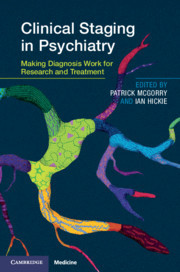Description
Clinical Staging in Psychiatry
Making Diagnosis Work for Research and Treatment
Coordinators: McGorry Patrick D., Hickie Ian B.
Clinical staging is a solution to transform psychiatric diagnosis and improve mental health outcomes.
Language: English
Subject for Clinical Staging in Psychiatry:
Publication date: 08-2019
206 p. · 15.7x23.3 cm · Paperback
206 p. · 15.7x23.3 cm · Paperback
Description
/li>Contents
/li>Biography
/li>
Psychiatric diagnosis is experiencing a crisis of confidence. Current approaches are outmoded, with reform desperately needed. Clinical staging is a solution to this crisis. Clinical staging addresses the limitations of current diagnostic systems by recognising the full continuum or trajectory of mental illness from asymptomatic to chronic illness. It acknowledges the overlap between mental health symptoms during early stages and directly links each stage to treatment and underlying cognitive, neurological and biological changes. This approach enhances chances of early identification, promotes the implementation of safer treatments, and increases opportunities to alter the negative trajectory of mental disorders. This book comprehensively describes the conceptual basis of clinical staging in psychiatry, details current progress in identifying biomarkers for each stage, and explores the implications of staging on treatment and health systems. This book provides a foundation for transformational reform in psychiatric diagnosis.
List of contributors; Foreword; Acknowledgements; Part I. Conceptual and Strategic Issues: 1. Diagnosis without borders: a pluripotential approach to preventive intervention in emerging mental disorders Patrick D. McGorry; 2. Clinical staging and its potential to enhance mental health care Cristina Mei, Patrick D. McGorry and Ian B. Hickie; 3. Time for a change: a more dynamic perspective on psychopathology Johanna T. W. Wigman and Stijn de Vos; 4. A moving target: how risk for mental disorder can be modelled in dynamic rather than static term Barnaby Nelson, Patrick D. McGorry and Jessica A. Hartmann; Part II. Progress with Clinical Staging: 5. The utility of clinical staging in youth mental health settings: neurobiological and longitudinal data from Sydney-based studies of transdiagnostic cohorts Ian B. Hickie, Joanne S. Carpenter, Frank Iorfino, Elizabeth Scott, Shane Cross and Daniel F. Hermens; 6. Neuroimaging and staging: do disparate mental illnesses have distinct neurobiological trajectories? Cali F. Bartholomeusz and Christos Pantelis; 7. Staging of cognition in psychiatric illness Kelly Allott; 8. Neuroinflammation and staging Bernhard T. Baune; 9. Bioactive and inflammatory markers in emerging psychotic disorders Gregor E. Berger; 10. Electroencephalography and staging Suzie Lavoie; Part III. Novel Treatment Strategies: 11. Novel treatment strategies: biological Paul Amminger and Maximus Berger; 12. Psychosocial interventions for youth mental health Eóin Killackey and Mario Alvarez-Jimenez; Part IV. Translational Aspects: 13. Transforming cultures to enable stage-related care of mental ill health: a youth mental health challenge Patrick D. McGorry, Ian B. Hickie and Shane Cross; 14. The quest for clinical utility and construct validity in psychiatric diagnosis Patrick D. McGorry.
Patrick McGorry is a world-leading clinician, researcher and reformer in early psychosis, early intervention and youth mental health. He played an integral role in the development of safe, effective treatments and innovative research for young people with emerging mental disorders. He has published extensively and is a Fellow of numerous academies including the Australian Academy of Science.
Ian Hickie is an internationally renowned researcher in clinical psychiatry. He was an inaugural Commissioner on Australia's National Mental Health Commission (2012–18) overseeing enhanced accountability for mental health reform and suicide prevention. In this role and his independent research, health system and advocacy roles, Professor Hickie has been at the forefront of the move to have mental health and suicide prevention integrated with other aspects of health care.
Ian Hickie is an internationally renowned researcher in clinical psychiatry. He was an inaugural Commissioner on Australia's National Mental Health Commission (2012–18) overseeing enhanced accountability for mental health reform and suicide prevention. In this role and his independent research, health system and advocacy roles, Professor Hickie has been at the forefront of the move to have mental health and suicide prevention integrated with other aspects of health care.
© 2024 LAVOISIER S.A.S.




